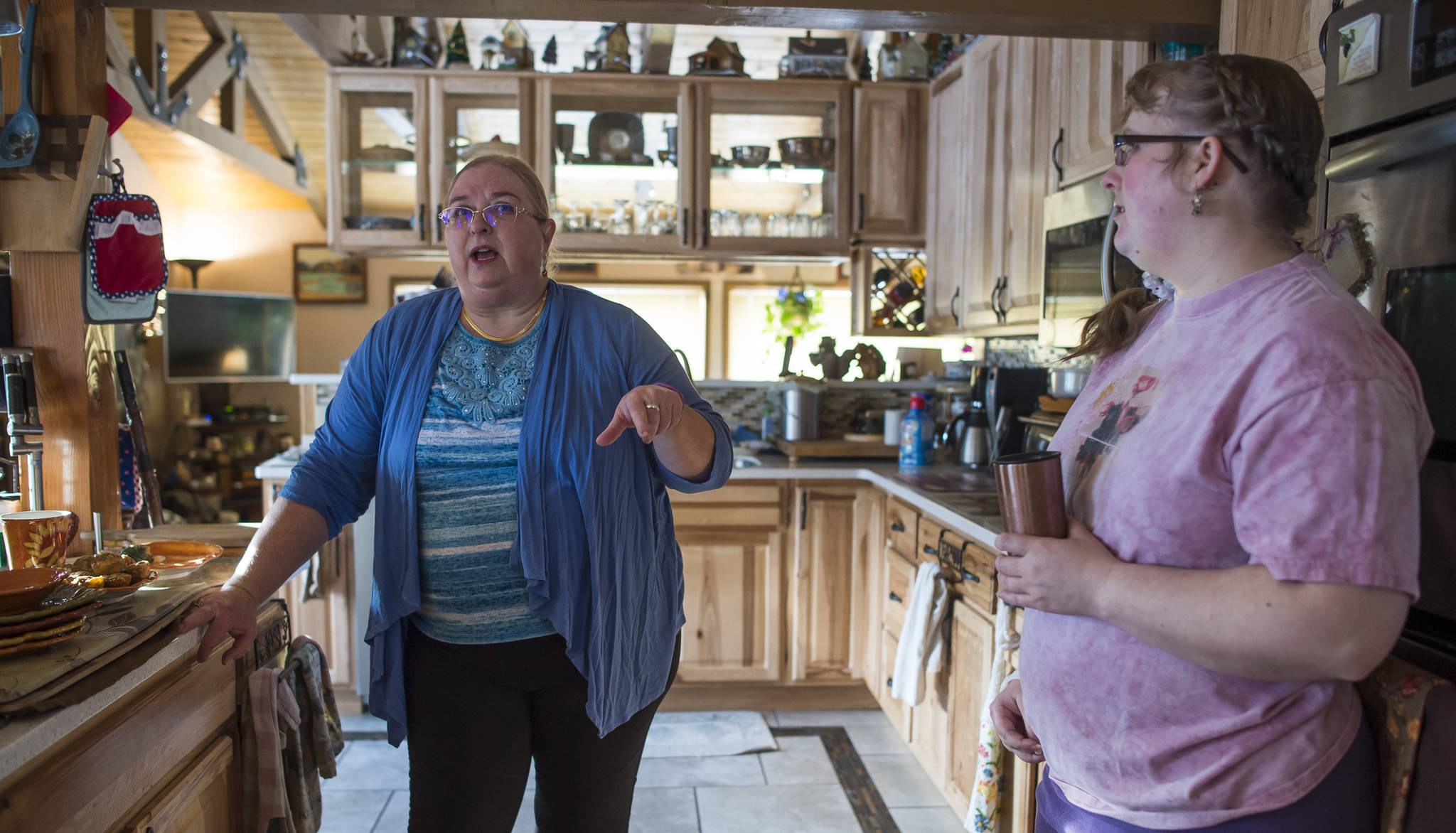The Frickey residence, located Out the Road, is in a picturesque spot. Snow-laden trees surround the house, the interior of which is bright, wood-paneled and decorated for the holidays.
Despite the beauty, it can be treacherous living out there, due to isolation and the bears that lurk around the property. For Gina Frickey, living in the house with her mother Sandy, cerebral palsy and memory issues made it even more dangerous.
“I would be getting up in the middle of the night, I would be trying to use the restroom and then falling down,” Gina explained.
Gina, 39, would also sometimes forget to close the doors when she went outside, leaving the family’s multitude of dogs and cats at risk of escaping — or allowing outside animals to come into the house.
A longtime client of REACH, Gina has thrived in a variety of realms, from being one of the early leaders of REACH’s shredding program to producing pottery at The Canvas community art studio. But her struggles at home were frustrating both for her and Sandy.
A solution to their problems was all the way in North Carolina. A company called SimplyHome specializes in designing in-home systems that assist individuals with disabilities, and the Frickey house recently became the second residence in Alaska to have the system installed.
Motion sensors are installed above all the exterior doors, and in multiple locations in the house as well. The system was specifically designed to make for a safer environment when Gina gets up in the night to use the bathroom. There’s a pad on her bed that senses whether she’s in bed or not, which then communicates with other sensors around the house.
The motion sensor in the bathroom knows when Gina is out of bed, and calls Gina out by name if it senses she has fallen asleep or fallen in the bathroom. To add to that, Sandy gets alerts to her phone if Gina has been out of bed or immobile for a certain period of time.
These precautions have put both of them at ease.
“Safety-wise,” Sandy said, “things are a lot better.”
Representatives from REACH first met SimplySafe employees at an American Network of Community Options and Resources (ANCOR) conference, and talked back and forth with them for the ensuing months.
This February, SimplyHome representatives ended up coming up to Juneau to see what kind of distinctive challenges and situations people with disabilities were facing in town. SimplyHome Chief Development Officer Jason Ray was on that trip, and said he and his colleagues were immediately interested.
“REACH really wanted to be a pioneer and a leader in Alaska for finding new ways to support their individuals,” Ray said. “They really saw this as a good opportunity for them and we wanted to help them in that process.”
Juneau is currently the only city in the state with SimplyHome, and the company now has installations in more than 30 states. There are four residences in Juneau with systems in place, with the Frickeys’ house being the second. There are two more residences currently working with SimplyHome now, REACH Service Coordinator Sabrina Cardinal said.
The system, which is run through a large white box centrally located in the house, has been easy to operate. Sandy, a self-described non-techie, said she doesn’t touch the equipment much and that it’s worked well on its own. Each system is catered to the specific residents, helping in areas such as cooking safety, bathing needs, sleep patterns, food access, medication safety and general independence.
The system cost a little more than $3,000 at the Frickeys, in addition to a $65 fee per month, but REACH does quite a bit in applying for grants and helping to fund the systems. REACH employee Henry Wyatt installs the systems, which saves about $500 in installation fees.
Overall, the system has put Gina and Sandy more at ease. The five cats and two dogs (as well as neighbor dogs and grand-dogs) are less likely to go out of the house with motion sensors to remind Gina to close the door.
Most importantly, though, Gina feels safer and more secure in her home.
“I would recommend it to anybody and everybody who might need it,” Gina said, “because it’s an awesome thing to have.”
• Contact reporter Alex McCarthy at 523-2271 or alex.mccarthy@juneauempire.com.

